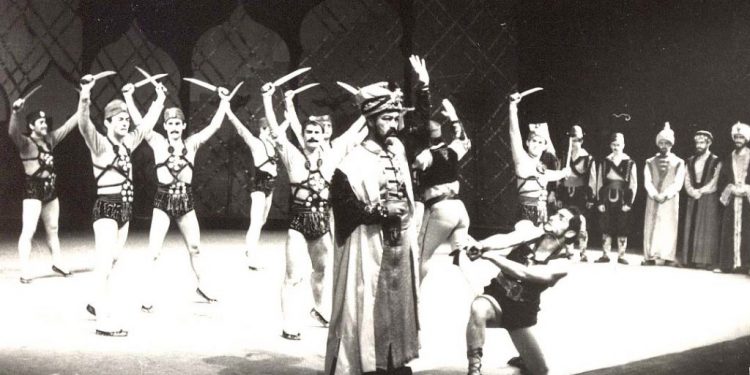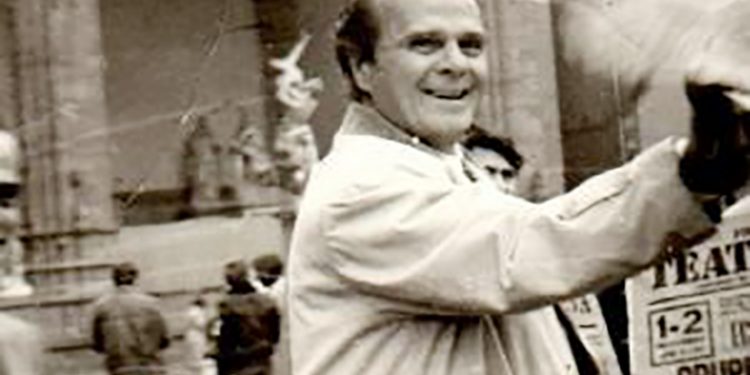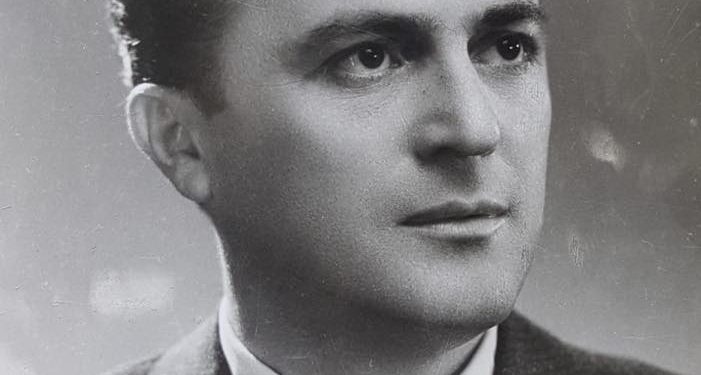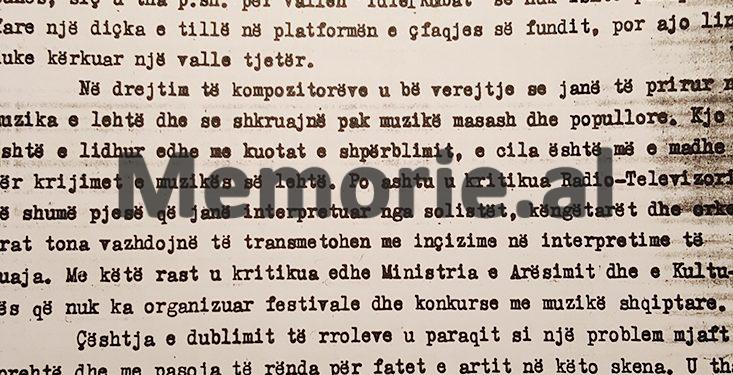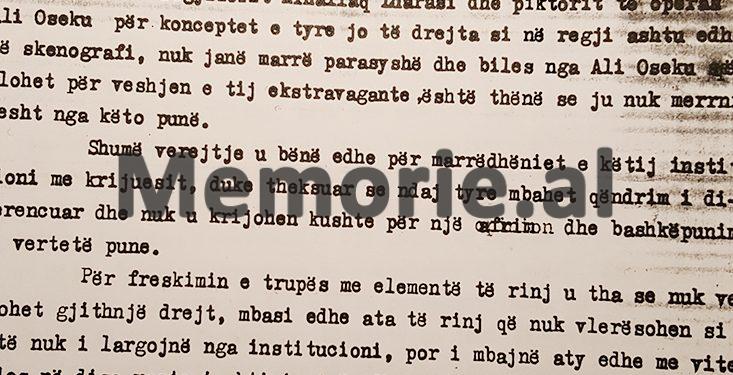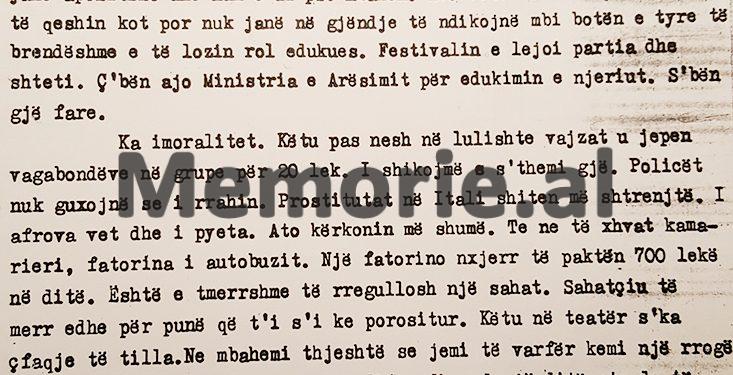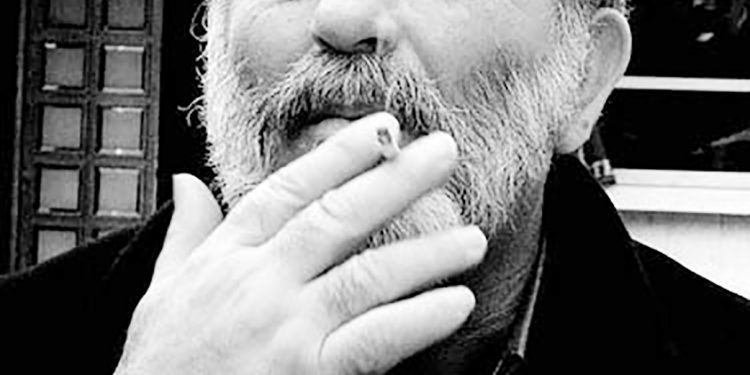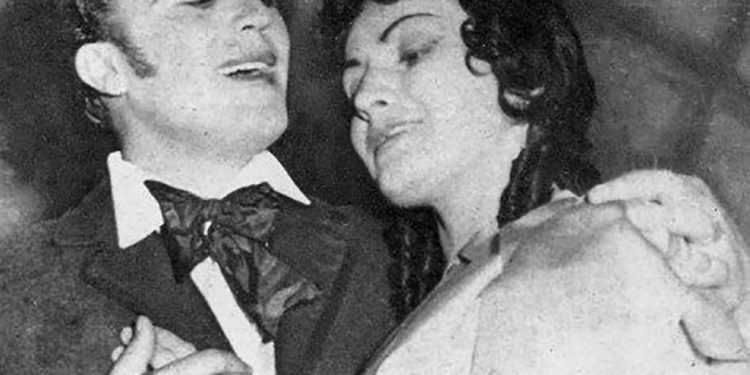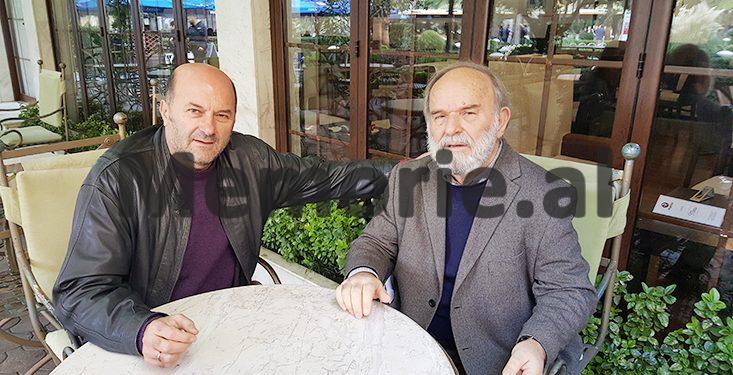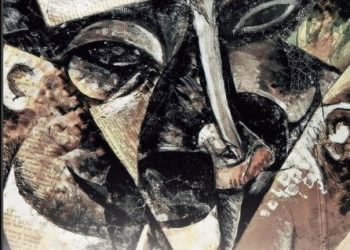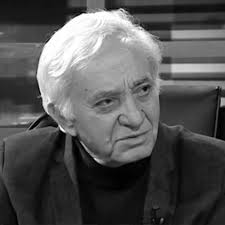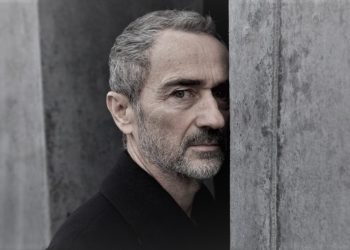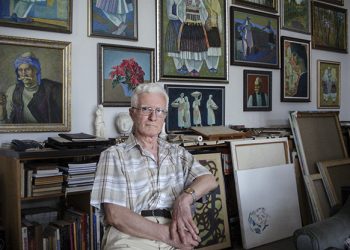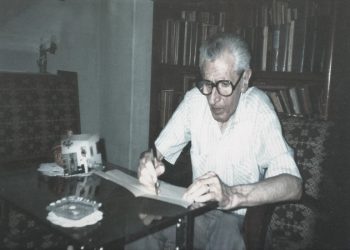Dashnor Kaloçi
Memorie.al publishes an archival document issued by the Central State Archive in Tirana (fund of the former Central Committee of the ALP), which contains a report-information dated March 18, 1973, these two instructors of the apparatus of The Central Committee of the ALP, YD and AM, who chaired a control team that participated in the meeting of the Opera and Ballet Theater, inform Ramiz Alia, the relevant secretary who covered propaganda, art and culture, regarding the discussions that took place by the participants in that meeting, where some artists were criticized, such as the soloist, Gaqo Çako, the choreographer Panajot Kanaçi, the scenographer Ali Oseku, etc.
In the framework of numerous meetings that were held in all cultural and artistic institutions of Tirana and the whole country at the beginning of 1973 after the speech of Enver Hoxha in the apparatus of the Presidium of the People’s Assembly (March 15 and 16, 1973), which took place from the 11th Song Festival on the Albanian Radio-Television, also in the Opera and Ballet Theater and the Ensemble of Folk Songs and Dances, several consecutive meetings were held where the work done up to that time was discussed and analyzed. two very important institutions of the cultural and artistic life of the capital.
The series of meetings in those two very important artistic institutions were opened by those that were held on March 18, 1973, just two days after Enver Hoxha’s speech held in the apparatus of the Central Committee of the ALP, where the main topic was: “The fight against foreign and liberal performances in art and culture and their impact on the life of the country…”. This is also made known by this archival document (which has been extracted from a voluminous file with the secret logo) where the two delegates of the Central Committee of the ALP (YD and AM) have compiled the relevant information about Ramiz Alia, the respective secretary covering propaganda, art and culture.
As can be seen from the document in question, the choreographer Panajot Kanaçi was initially criticized at the Opera House, who was considered the “cream” of the Opera and Ballet, which meant that the great ‘storm’ that had just begun would not spare anyone. Also, after the famous choreographer, the well-known painter and scenographer Ali Oseku was criticized in the information report, who was also considered at that time as the ‘cream’ of Albanian scenography, where in addition to the professional side, the ‘arrows’ on him have also his dress and appearance.
Another very interesting thing that is noticed in the report-information in question, is the large part that takes place there for the Opera soloist, Gaqo Çako, who has discussed and talked at length, not only about the problems of work in Opera and Ballet, but also for other things outside the doors and interests of these institutions. For more about this, let us know this report-information that is published in full and for the first time in the pages of this book.
Letter from the two instructors of the Central Committee of the ALP, Y.D and A. M., for the meeting at the Opera and Ballet Theater in Tirana
I N F O R M A T I O N
ON THE WORK OF COMRADE ENVER’S SPEECHES IN COLLECTIVES
OF THE OPERA AND BALLET AND THE ENSEMBLE THEATER
POPULAR SONGS AND DANCES
The Central Committee Apparatus team attended several meetings of the Opera and Ballet Theater and Song and Dance Ensemble collectives, where Comrade Enver’s last two speeches were delivered.
The general impression is that the employees are not well acquainted with these two speeches, which was also reflected in the discussions, which were generally shallow, sometimes on a personal level and moreover the emphasis was placed on the fact that from these things we do not we have a lot, since we are artists and as such we only want beautiful things.
“Panajot Kanaçi’s dance, ‘Idil and Kurbat’ was criticized”
However, several issues were raised at these meetings:
There were discussants who expressed the opinion that even in these institutions there are manifestations of the influences of revisionist bourgeois art and culture. Thus, in the last premiere of the Ensemble “Wedding from our life”, Panajot Kanaçi’s dance was criticized, “Idil dhe Kurbat” that promotes sensuality, that in its music there are performances of orientalism, etc., or the other dance “Tropojani Rini”, which deforms popular character etc. The decor of this premiere was also criticized as well as some costumes that appeared on stage.
There was also criticism of the decor of the opera “Travjata”, and the costumes of this show (dresses, necklines, mass cowboy pants, heavy decor in the decor without any functional value).
Regarding the attitude towards foreign and national works, it was said that the directorate, the artistic council and the artistic leaders are very careful about foreign works and less about national ones. Comparing the re-staging of the opera “Travjata” and “Skanderbeg”, it was said that for the first one worked intensively for a year, although 50% of the participants had played it before, while for the opera “Skanderbeg” the work was it was superficial, although it also has flaws that need to be corrected, and even the director who had previously staged it was not called.
Greater attention to the foreign repertoire in some cases was justified and motivated as a professional requirement to increase the technical level of soloists and instrumentalists, although, at the same time, the other opinion was expressed that through a more persistent and deep work many values of national music can be discovered that can also serve as a solid basis for technical uplift.
Some discussants, especially those in the category of responsible functions, tried to justify foreign performances in choreography, scenography and costumes, as performances that arose by chance in the work process, as stated e.g. for the dance “Idil e Kurbat” that such a thing was not foreseen at all on the platform of the last show, but she was born looking for another dance.
“Composers tend to light music”
In terms of composers it was remarked that they are inclined to light music and that they write little mass and folk music. This is also related to the reward quotes, which is greater for light music creations. Radio-Television was also criticized that many pieces that have been performed by our soloists, singers and orchestras continue to be broadcast with recordings in foreign performances. On this occasion, the Ministry of Education and Culture was criticized for not organizing festivals and competitions with Albanian music.
The issue of role duplication was presented as a rather acute problem and with serious consequences for the fate of art in these scenes. It was said that generally artistic directors and directors follow a policy of stars, who do not let others take the stage, even when they are sick, that they do not debut with a “weak” partner (young) and go to the extent that they agree with each other not to come to the show when any of the star partners are absent. As a result of all these troops went to the People’s Republic of China without the dubbing of the role of “Mountain Dog”. The same thing happens with the direction that has been monopolized in the hands of his friend, Rifat Teqja.
The problem arose among many young people that they were often treated unfriendly and their actions were severely judged. The demands on them are generally of a high level, even to the extent that affirmed artists have achieved, this has demobilized and thrown them into indifference.
“Scenographer Ali Oseku is distinguished for his extravagant dress”
Regarding the implementation of the line of measures, it was said that recently the voice of the collective has started to be heard less. It is slowly giving up the practice that premieres before they go on stage and are watched by the collective and others, to give opinions. Thus, in the last rehearsal of the Opera “Traviata”, members of the collective were not allowed to come at all, so as not to “kill the baby in the cradle” as it turned out at the meeting. Although even those remarks that were made in some cases to the director Mihallaq Luarasi and the opera painter Ali Oseku for their unfair concepts both in directing and scenography, were not considered even by Ali Oseku and is distinguished for his clothing extravagantly it is said that you do not get out of these jobs.
Many remarks were made about the relations of this institution with the creators, emphasizing that a differentiated attitude is maintained towards them and conditions are not created for a real attitude and cooperation.
Regarding the updating of the troupe with new elements, it was said that it is not always done right, since even those young people who are not considered capable do not leave the institution, but keep them there for years, and in some cases even activate them in performances… This has created a state of uncertainty for them and in some cases, they even claim for their skills or for a salary increase. It was said that some young people are often taken for the sake of the young and the work is not done properly to differentiate between the able and the disabled.
There was a lot of criticism in the address of the party organizations, which do not bring to the end the problems and concerns that the employees have, this has left room for them to think that whether you speak or not speaks is the same. In the meeting of the soloists’ sector in particular we were badly impressed by the discussion of sh. Gaqo Çako who in our opinion on these issues is not clear and has cabbage in his head and not because he does not know how to speak nicely as he is justified. Here we are laying out what he said in this discussion.
“Gaqo Çako said that the 11th Song Festival was allowed by the party and the state”
“The party does very well to raise these issues because they concern a people. We are for beauty and not for what was made and tolerated by the state itself. Comrade Enver has taught us to be correct. These are also allowed by party secretaries in the districts who take Comrade Enver’s speeches and other party documents and lock them in a drawer and do not read them at all or read them sometimes and are not understood. Our pop musicians who are apolitical and do not know why they are held have a bad influence. They only make people laugh in vain but they are not able to influence their inner world and play an educational role. The festival was allowed by the party and the state. What does the Ministry of Education do for human education? It does nothing at all. There is immorality. Here behind us in the gardens the girls are given to the vagabonds in groups for 20 lek. We look at them and say nothing. The police do not dare to beat them. Prostitutes in Italy are sold more expensively. I approached them myself and asked. They demanded more. With us, the waiter extorts money, invoices, etc. An invoice issues at least 700 ALL per day. It’s awful to fix a clock. Sahatçiu also hires you for work that you have ordered. There are no such performances here in the theater. We are simply held that we are poor and have a salary, those who steal are better dressed, and one day they will even ask for passports to go to Italy to squander the money they have millions. “I am convinced that these things will not be fixed anymore.”
After this discussion we immediately took a stand on the issues that Comrade Gogo did not raise right. These were briefly some of the problems that arose./Memorie.al
Y.D.
A.M.
Tirana, on 18.III.1973




